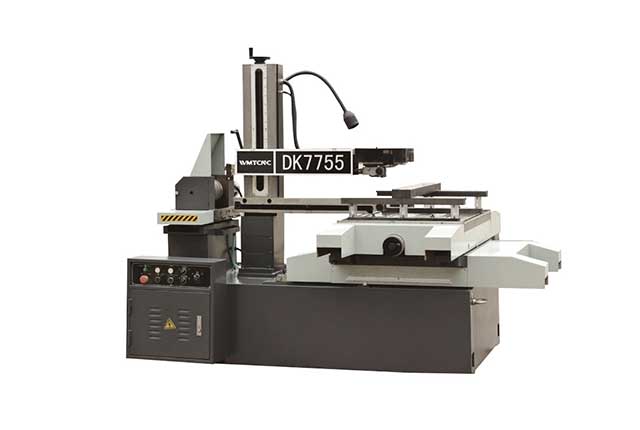WMT CNC Industrial Co., Ltd | All Rights Reserved.Design & Developed by VW Themes

Wire electrical discharge machining (EDM) is a process of metal machining in which a tool discharges thousands of sparks to a metal workpiece. A non-conventional process, though hardly a new one, wire cut EDM works on parts resistant to conventional machining processes, but only if these parts are electrically conductive; usually, they are non-ferrous, and include steel, titanium, superalloys, brass, and many other metals. Instead of cutting the material, EDM melts or vaporizes it, producing comparatively small chips and providing a very accurate cut line. Industry-wide acceptance has led to a wide variety of EDM applications, as it is highly versatile, can cut hard metals, and utilizes a relatively compact amount of workspace.
Because of its versatility, manufacturers use EDM wire cut machine operation for an extensive range of applications. Because the process can cut very small pieces, it is often an ideal choice for the production of small, highly detailed items that would normally be too delicate for other machining options. Additionally, the process is cost-effective for low quantity projects and can prove to be beneficial in prototype manufacturing, even if the actual project is carried out by different means.
It is important to remember that the wire in the process is constantly moving, and not to be reused. As a result, the copper, brass, or other metallic wire can be miles long, adding cost to the process. And, while the process uses no force and thus does not cause burrs and can be used on delicate items, the possibility of thermal stress is certainly present.
Most machining operations using wire EDM begin with a rough pass with a fairly fast feed rate and high dielectric flow. Successive skim passes take smaller cuts with a reduced dielectric flow to bring finished surfaces into tolerance. The reduced dielectric flow avoids distorting the wire during these skim passes.
Cuts that do not begin along an edge of a part (such as holes) require predrilling to allow the wire to thread through. Many wire EDM machines are fitted with small hole drilling electrodes for this purpose, permitting starting holes to be made in hardened steels without the use of conventional drills. Small hole drills usually employ an EDM electrode mounted in a spinning mandrel with dielectric pumped through the electrode to flush the hole. The process of making small holes in hardened material using standalone EDM drills is sometimes referred to as hole popping.